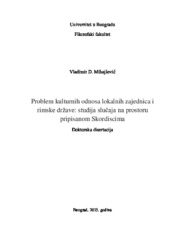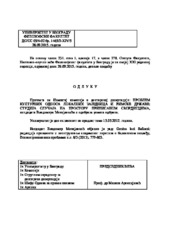Приказ основних података о дисертацији
Problem kulturnih odnosa lokalnih zajednica i rimske države: studija slučaja na prostoru pripisanom Skordiscima
The problem of cultural interactions of local communities and the Roman state: the case study of the area ascribed to the Scordisci
| dc.contributor.advisor | Babić, Staša | |
| dc.contributor.other | Cvjetićanin, Tatjana | |
| dc.contributor.other | Palavestra, Aleksandar | |
| dc.contributor.other | Kuzmanović, Zorica | |
| dc.creator | Mihajlović, Vladimir | |
| dc.date.accessioned | 2020-07-03T10:04:57Z | |
| dc.date.available | 2020-07-03T10:04:57Z | |
| dc.date.issued | 2015-10-19 | |
| dc.identifier.uri | https://nardus.mpn.gov.rs/handle/123456789/4264 | |
| dc.identifier.uri | http://eteze.bg.ac.rs/application/showtheses?thesesId=2314 | |
| dc.identifier.uri | https://fedorabg.bg.ac.rs/fedora/get/o:10212/bdef:Content/download | |
| dc.identifier.uri | http://vbs.rs/scripts/cobiss?command=DISPLAY&base=70036&RID=526110615 | |
| dc.description.abstract | Period mlađeg gvozdenog doba (c. III v. pre n.e.–I v.n.e) na području centralnog Balkana i južne Panonije decenijama je u istoriografiji i arheologiji bio sagledavan kao vreme dominacije plemenske zajednice keltskih Skordiska. Razumevanjem populacija koje su u poslednja tri veka stare ere živele na pomenutom području kao kompaktne etničke celine, uslovilo je da se i njihovi kontakti i odnosi sa Rimskom imperijom tumače kao interakcije dva jasno omeđena etno-kulturna entiteta. Sleđenjem antičkih pisanih izvora, relacije između Rimljana i Skordiska shvatane su kao jednolinijski proces postepenog potpadanja pod rimsku vlast, od inicijalnih sukoba i manje-više konstantnih neprijateljstava do konačnog pokoravanja i romanizovanja Skordiska. U disertaciji se preispituju epistemološke osnove i teorijskometodološki pristupi pomoću kojih su formirana navedena tumačenja i ukazuje se na drugačije mogućnosti interpretacije ovog dela prošlosti i problema interkulturnih odnosa na relaciji lokalne zajednice i Rimska imperija. Upotrebom teorijskih postulata koji su unutar arheologije proklamovani postprocesnim pristupom, rad se fokusira na mogućnosti upotrebe konstruktivističke teorije o identitetima. Shvatanjem pojedinačnih i grupnih određenja kao pluralnih, situaciono uslovljenih i promenljivih načina svrstavanja, skreće se pažnja na pristupe lišene etničkog determinizma koji je, od kraja XIX veka, dominirao arheološkim i istoriografskim proučavanjima protoistorijske i antičke epohe u domaćem akademskom kontekstu. Kritičkim preispitivanjem konstitutivnih činilaca postojećeg akademskog narativa o Skordiscima i procesu njihove romanizacije, u radu se ukazuje da su dosadašnje interpretacije bile pod suviše jakim uticajem vizura iz antičkih pisanih izvora i modernih teorija o etnosu/naciji kao najvažnije vrste kolektivnog identiteta. Pošto su i antički literarni izvori i moderne teorije o nacionalnom grupisanju nastale u specifičnim socio-političkim i ideološkim okolnostima, njihove perspektive nemaju karakter objektivnih naučnih pristupa za tumačenje identitetskih određenja kasnogvozdenodopskih zajednica na označenom području. Odatle, u disertaciji se predlaže da je pojam Skordisci antička imagološka konstrukcija za okvirno označavanje i pseudo-etničko definisanje balkanskih i južnopanonskih „varvara“, koja je nekritički preuzeta i dalje reifikovana u domaćoj istoriji i arheologiji. Udaljavanjem od pretpostavke da Skordisci predstavljaju jedinstvenu etničku zajednicu u radu se predlažu drugačiji interpretativni putevi za sagledavanje kasnogvozdenodopskih socio-kulturnih struktura i njihove integracije sa Rimskom imperijom. Uzimanjem u obzir sheme naseljavanja i pogrebne prakse, ukazuje se da su u poslednja dva veka stare ere na području južne Panonije i Balkana postojale mnogobrojne zajednice na mikroregionalnim i regionalnim nivoima, koje se pre mogu okarakterisati kao heterogene i heterearhične/segmentarne/korporativne, nego kao hijerarhijski organizovana i centralizovana plemenska zajednica Skordiska. Ovakvim pristupom se problematizuje pitanje etniciteta, u smislu preispitivanja koliko je ovakav vid društvenog grupisanja uopšte bio važan u kasnogvozdenodospskom svetu. Posledično, interakcije sa Rimskom imperijom ne mogu se tumačiti kao jednosmeran socio-kulturni uticaj Rimljana na Skordiske, niti romanizovanjem skordističke kulture, već kao čitav niz različitih lokalizovanih odnosa, od nivoa pojedinaca do nivoa manjih geografskih područja. S tim u vezi, rad preusmerava pitanje interkulturnih odnosa od generalizirajućih koncepata kompaktnih kultura (rimske i skordističke) na partikularna iskustva i raznovrsne ishode interakcija, koji su zavisili od konteksta u kojima su se odigravali i različitih društvenih aktera koji su u njima učestvovali. | sr |
| dc.description.abstract | Inside Serbian/Yugoslavian historiography and archaeology, the late Iron Age (c. III c. BCE–I c. CE) of the Central Balkans and Southern Pannonia has been for decades seen as a period of domination of the Celtic Scordisci. The understanding of the populations of mentioned areas as compact ethnic whole caused the interpretations of their contacts and relations with the Roman Empire as interaction between two clearly defined ethno-cultural entities. Following the ancient written sources, modern scholars have been conceptualized these interactions as linear process of the Scordiscian gradual subjugation by the Romans, starting from the initial conflict and almost constant enmity to consequent Romanization. The thesis reviews epistemological backgrounds and methodological approaches used in the construction of these interpretations, and points to other possibilities for studying the late Iron Age in the region as well as the problem of intercultural relations between the local communities and the Roman Empire. Drawing on theoretical postulates proclaimed inside the post-processual archaeology, thesis focuses to the possibilities of the usage of constructivist theory of identities. By understanding the individual and group identifications as plural, situational and changeable ways of affiliation, the attention is directed to the interpretative approaches deprived of ethnic determinism which dominated Serbian/Yugoslavian Iron Age and Classical studies since the end of the 19th century. Employing the discourse analysis of the constitutional elements of the academic narrative of the Scordisci and their Romanization, the thesis suggests its biased character caused by the strong influence of ancient perspectives (derived from the written sources) and modern notion of ethnic/national affiliation as the most important type of collective identity. Since both ancient written sources and modern theories of national social gathering were formed under specific socio-political and ideological contexts, their perspectives do not have the character of objective academic approaches for interpreting the late Iron Age identity constructions. Hence, the dissertation proposes that the Scordisci should be comprehended as ancient imagological construction for vague signification and pseudo-ethnic definition of the Balkan and south Pannonian “barbarians”, which was uncritically adopted and further reified in Serbian/Yugoslavian historiography and archaeology. Departure from the notion of the Scordisci as single ethnic group enables different interpretative approaches for studying the late Iron Age socio-cultural structures and their integration with the Roman Empire. Taking into consideration settlement patterns and funeral practices the thesis suggests existence of numerous communities on micro/regional and regional levels in the area of the Central Balkans and Southern Pannonia in the last two centuries BCE. These communities could be regarded as heterogeneous and heterarchical/segmentary/corporative instead of hierarchically organized and centralized tribal community of the Scordisci. This perspective also reconsiders the question of ethnicity by reviewing if this sort of social grouping was as important in the late Iron Age as previously presumed. Consequently, the interactions with the Roman Empire cannot be further regarded as one direction socio-cultural influence of the Romans towards Scordisci, or the Romanization of Scordiscian culture, but as a string of diverse localized relations, from the level of individuals to the level of small geographical areas. Thus, the dissertation diverts the question of intercultural relations from the generalizing concepts of compact cultures (i.e. Roman and Scodiscian) to the particularized experiences and versatile outcomes of interactions, dependent on the contexts and various social actors involved in the process. | en |
| dc.format | application/pdf | |
| dc.language | sr | |
| dc.publisher | Универзитет у Београду, Филозофски факултет | sr |
| dc.relation | info:eu-repo/grantAgreement/MESTD/Basic Research (BR or ON)/177002/RS// | |
| dc.rights | openAccess | en |
| dc.rights.uri | https://creativecommons.org/licenses/by-nc-nd/4.0/ | |
| dc.source | Универзитет у Београду | sr |
| dc.subject | Interkulturni odnosi | sr |
| dc.subject | Intercultural relations | en |
| dc.subject | rimski imperijalizam | sr |
| dc.subject | Skordisci | sr |
| dc.subject | centralni Balkan | sr |
| dc.subject | južna Panonija | sr |
| dc.subject | mlađe gvozdeno doba | sr |
| dc.subject | romanizacija | sr |
| dc.subject | konstrukcije identiteta | sr |
| dc.subject | antički pisani izvori | sr |
| dc.subject | etnički determinizam | sr |
| dc.subject | Roman imperialism | en |
| dc.subject | Scordisci | en |
| dc.subject | the Central Balkans | en |
| dc.subject | Southern Pannonia | en |
| dc.subject | late Iron Age | en |
| dc.subject | Romanization | en |
| dc.subject | identity constructions | en |
| dc.subject | ancient written sources | en |
| dc.subject | ethnic determinism | en |
| dc.title | Problem kulturnih odnosa lokalnih zajednica i rimske države: studija slučaja na prostoru pripisanom Skordiscima | sr |
| dc.title | The problem of cultural interactions of local communities and the Roman state: the case study of the area ascribed to the Scordisci | en |
| dc.type | doctoralThesis | en |
| dc.rights.license | BY-NC-ND | |
| dcterms.abstract | Бабић, Сташа; Цвјетићанин, Татјана; Палавестра, Aлександар; Кузмановић, Зорица; Михајловић, Владимир; Проблем културних односа локалних заједница и римске државе: студија случаја на простору приписаном Скордисцима; Проблем културних односа локалних заједница и римске државе: студија случаја на простору приписаном Скордисцима; | |
| dc.identifier.fulltext | https://nardus.mpn.gov.rs/bitstream/id/27753/Disertacija78.pdf | |
| dc.identifier.fulltext | https://nardus.mpn.gov.rs/bitstream/id/27754/Vladimir_Mihajlovic_referat_FZF-27228.pdf | |
| dc.identifier.fulltext | http://nardus.mpn.gov.rs/bitstream/id/27753/Disertacija78.pdf | |
| dc.identifier.fulltext | http://nardus.mpn.gov.rs/bitstream/id/27754/Vladimir_Mihajlovic_referat_FZF-27228.pdf | |
| dc.identifier.rcub | https://hdl.handle.net/21.15107/rcub_nardus_4264 |



